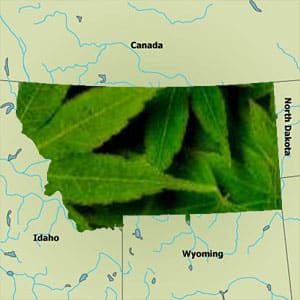
By Matt Volz, Associated Press
A medical marijuana provider indicted on federal drug charges warned other Montana caregivers Friday to shut down their businesses or risk being the next arrested.
Jason Burns, of Helena, said federal agents told him before his arraignment Thursday that the Department of Justice plans to indict every Montana caregiver raided this spring and that there may be more searches.
“I would warn every caregiver that is in business right now to shut down because the feds are going to prosecute you,” Burns said in an interview with The Associated Press.
Jessica Fehr, a spokeswoman for the U.S. attorney’s office, said she couldn’t comment on whether criminal charges are pending against other providers.
Burns’ alert may be moot, however, with a new state law scheduled to take effect July 1 that will bar all commercial medical marijuana operations. Providers will be prohibited from profiting from medical marijuana and will not be allowed to distribute pot to more than three registered patients under the law.
A judge is considering temporarily blocking all or part of the law until a constitutional challenge filed by a marijuana industry group is heard. The attorney general’s office said in a memo to Helena District Judge James Reynolds sent Thursday that blocking the law would be “unprecedented and unwarranted.”
Since Montana voters approved medical marijuana use in 2004, more than 4,800 medical marijuana providers — called caregivers in the state — have registered with the Department of Public Health and Human Services. They provide medical marijuana to more than 30,000 registered users, a number that state attorneys and advocates of tightening the law say shows the industry has spun out of control.

Queen City Caregivers, operated by Burns, 38, and Jesse Leland, 40, was among more than two dozen caregivers across the state raided in March and April. Federal agents seized drugs, cash, weapons, vehicles and computer equipment.
Burns, Leland and Josh Schultz, 38, the owner of Natural Medicine of Great Falls, were the first to be indicted on criminal charges related to those raids.
All three pleaded not guilty to charges of conspiracy, manufacture of marijuana, money laundering, distribution of marijuana and possession with intent to distribute. They have been conditionally released with a trial set for Aug. 8.
They face a mandatory minimum sentence of five years in prison and $5 million in fines if convicted.
The raids and the indictments are part of an ongoing investigation into marijuana distribution in Montana, the U.S. attorney’s office said. After the raids in March, U.S. Attorney Michael Cotter sent a letter to legislative leaders saying that prosecutors intend to pursue distributors of marijuana, which is listed a Schedule 1 narcotic under federal law, not seriously ill patients who follow state medical marijuana laws.
The raids and the imminent change in the Montana medical marijuana law have had the effect of chilling the industry. Many caregivers involved in the raids have gone out of business. Others have shuttered their storefronts while they wait to see what happens. Several have said they will start dealing on the black market again instead of risking arrest as registered providers.
Burns said he is being unjustly punished and is in compliance with Montana laws. He is a registered caregiver with the state, his business is licensed, and he is confident that a jury made up of Montanans who approved medical marijuana use in 2004 will ultimately acquit him.
“They can’t charge people with 40 years in prison and millions of dollars for something the state of Montana said we could do,” he said. “When the state of Montana issues you a card and says you can provide for these people, the responsibility lies with the state of Montana for making the law better.”
Burns said he and Leland grew plants for Schultz, and between them, they provided for between 225 and 250 patients. He said he made about $15,000 in profit last year.
His business has been raided two times by state authorities before the federal raids in March, though no charges have been filed against him until now, Burns said.
Federal charging documents allege Burns, Leland and Schultz grew more than 100 marijuana plants at various locations in the state, including Helena and Belgrade.
He and Leland moved their Helena growing operation after a 2010 raid, so when federal agents swooped in this spring, they only confiscated 10 dead plants and grow lights, he said. He declined to say where the new growing operation was located.
Burns said the charges are overblown, particularly the money laundering charge leveled against him for depositing money from his licensed business into a bank account.
“Marijuana is not out of control. The only thing out of control is the law enforcement,” he said.
 ''A survey in Australia out today proves that cannabis can be up to 8 times more addictive than heroin. Would you agree with this and is it REALLY that addictive?''
''A survey in Australia out today proves that cannabis can be up to 8 times more addictive than heroin. Would you agree with this and is it REALLY that addictive?''
 LIT Limerick Institute of Technology
LIT Limerick Institute of Technology

















 In 1967, because of my concern about the rapidly growing use of the dangerous drug marijuana, I began my studies of the scientific and medical literature with the goal of providing a reasonably objective summary of the data which underlay its prohibition. Much to my surprise, I found no credible scientific basis for the justification of the prohibition. The assertion that it is a very toxic drug is based on old and new myths. In fact, one of the many exceptional features of this drug is its remarkably limited toxicity. Compared to aspirin, which people are free to purchase and use without the advice or prescription of a physician,
In 1967, because of my concern about the rapidly growing use of the dangerous drug marijuana, I began my studies of the scientific and medical literature with the goal of providing a reasonably objective summary of the data which underlay its prohibition. Much to my surprise, I found no credible scientific basis for the justification of the prohibition. The assertion that it is a very toxic drug is based on old and new myths. In fact, one of the many exceptional features of this drug is its remarkably limited toxicity. Compared to aspirin, which people are free to purchase and use without the advice or prescription of a physician,